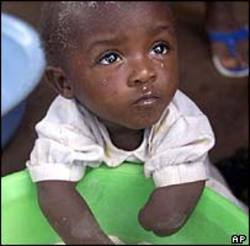Darfur, the other five year war.
Posted by Anita Sharma
The other five year war, Darfur, may receive less attention than Iraq but that doesn’t mean that the level of suffering is less horrific, or the path to peace any easier. In fact the situation is actually worsening: more people are dying and being displaced, food rations to the needy are about to be cut in half, the full deployment of a new peacekeeping force has been delayed until 2009 and the Sudanese government and rebel groups are resisting new peace negotiations.
"We continue to see the goal posts receding, to the point where peace in Darfur seems further away today than ever," said John Holmes, under secretary general for humanitarian affairs at the UN. In his report to the UN Security Council on Tuesday, Holmes said of Darfur's estimated 6 million people, some 4.27 million have now been seriously affected by the conflict and perhaps as many as 300,000 have been killed.
Although the needs continue to be great, the World Food Program recently announced it was cutting food rations in half because attacks on its trucks have reduced stocks. Today the WFP said that one of its drivers was killed when his truck broke down during a police escorted aid convoy, further illustrating the perils.
UNAMID, the a joint U.N.-African Union force agreed to by Sudan, was supposed to be deployed to offer protection to convoys like these. But so far only about 9,000 of the authorized 26,000 peacekeepers have been deployed. Yesterday, Jane Holl Lute, a senior U.N. official who overseas the organization's field operations, (and my former boss at the Carnegie Commission on Preventing Deadly Conflict), briefed the Senate Foreign Relations Committee and said that the mission lacks still lacks five critical capabilities to become operational – attack helicopters, surveillance aircraft, transport helicopters, military engineers and logistical support, not to mention the other soldiers to fulfill the mission.
During the same hearing the U.S. Envoy to Sudan Richard Williamson defended the U.S. decision to meet recently with Sudan's government about the possibility of better ties, and said that concrete progress toward ending the "slow-moving genocide" in Sudan's Darfur region must take place before the United States will improve relations with Khartoum.
So what needs to happen?
First: give the UN the equipment is so desperately needs. According to Lute there are 4,000 helicopters currently in NATO countries. This mission requires 24.
Second: according to Ken Bacon, the President of Refugees International, the international community needs to pressure both the government of Sudan and the fractious rebel groups to get to the peace table.
The U.S. and its European and Middle Eastern allies should impose strict travel sanction on Sudanese government and rebel leaders until they reach a peace agreement. In addition, arms embargos on both the government and rebel groups should be closely enforced.
Third: keep up the pressure on China. Although recent events in Tibet have over-shadowed Darfur in terms of Beijing's human rights record, the issue remains the same. China is the top arms supplier to Sudan and a major investor in Africa's largest country, particularly in its oil industry. It has tremendous influence on Khartoum’s decisions. While not calling for a boycott or the Olympics, on Wednesday Dream for Darfur released report cards of the top Olympic sponsors and said 16 out of 19 top Olympic sponsors it had contacted had failed to speak out against the genocide out of fear of offending China. It said it would target corporate headquarters for protests, starting with Coca-Cola.
All three presidential candidates say that President Bush should skip the opening ceremonies if China does not improve its human rights record in Tibet and Darfur. Thus far the leaders of Great Britain, Germany, Canada, Poland, Estonia and the Czech Republic have said they will not attend the opening ceremonies.
Senator Barack Obama, D-Presidential Candidate: "If the Chinese do not take steps to help stop the genocide in Darfur and to respect the dignity, security and human rights of the Tibetan people, then the president should boycott the opening ceremonies.”
Senator Hillary Clinton, D-Presidential Candidate: “At this time, and in light of recent events, I believe President Bush should not plan on attending the opening ceremonies in Beijing, absent major changes by the Chinese government."
Senator John McCain, R-Presidential Candidate: "Unless they change something pretty quickly, I would not go to the opening ceremonies.”
However, President Bush says he will attend the Games.
"I don't view the Olympics as a political event. I view it as a sporting event," he said.






